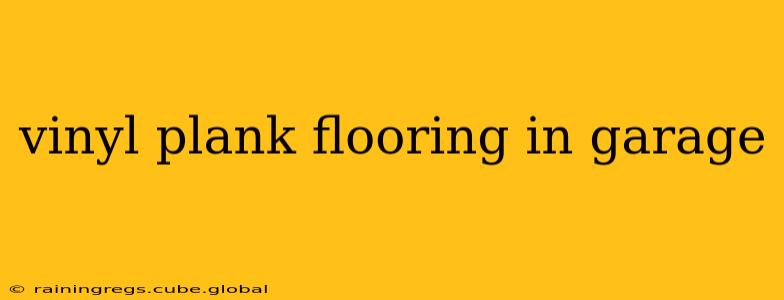Garages, often the unsung heroes of our homes, endure a lot. From seasonal temperature swings to the occasional spill, they need flooring that can withstand the test of time. Vinyl plank flooring has emerged as a popular choice for garage floors, offering durability, affordability, and style. This comprehensive guide will explore the benefits, considerations, and installation process of vinyl plank flooring in your garage.
Why Choose Vinyl Plank Flooring for Your Garage?
Vinyl plank flooring offers a compelling combination of practicality and aesthetics for garage applications. Its resilience makes it ideal for high-traffic areas and potential spills, while its variety of styles allows you to enhance your garage's look and feel. Key benefits include:
- Durability: Vinyl planks are resistant to scratches, dents, and stains, making them perfect for handling heavy equipment, dropped tools, and accidental spills.
- Water Resistance: Unlike traditional wood flooring, vinyl planks are highly water-resistant, protecting your garage floor from moisture damage caused by leaks, spills, or humidity.
- Easy Maintenance: Cleaning a vinyl plank garage floor is a breeze – simply sweep, mop, or use a pressure washer for a deeper clean.
- Affordability: Vinyl plank flooring is generally more budget-friendly than other garage flooring options, such as epoxy or concrete staining.
- Variety of Styles: You can find vinyl planks that mimic the look of wood, stone, or tile, allowing you to personalize your garage's aesthetic.
- DIY-Friendly Installation: While professional installation is always an option, many types of vinyl plank flooring are designed for DIY installation, saving you money.
What Type of Vinyl Plank Flooring is Best for a Garage?
Choosing the right type of vinyl plank flooring is crucial for long-term performance in your garage. Consider these factors:
- Thickness: Thicker planks generally offer better durability and impact resistance. Look for planks at least 5mm thick.
- Wear Layer: The wear layer is the top surface of the plank, determining its resistance to scratches and abrasions. A thicker wear layer (at least 20 mils) is recommended for garages.
- Waterproof vs. Water-Resistant: While most vinyl planks are water-resistant, opting for completely waterproof planks is ideal for garages prone to moisture. Check the manufacturer's specifications carefully.
- Click-Lock vs. Glue-Down: Click-lock planks are easier to install and can be removed and replaced more easily, but glue-down planks offer superior durability and water resistance.
How to Install Vinyl Plank Flooring in a Garage?
The installation process will depend on the type of vinyl plank flooring you choose (click-lock or glue-down). Regardless of the type, proper surface preparation is key. This typically includes cleaning, patching cracks or holes in the concrete, and ensuring the surface is level and dry.
Click-Lock Installation: This is generally a more DIY-friendly method. Follow the manufacturer's instructions carefully, paying attention to proper plank alignment and interlocking.
Glue-Down Installation: This method requires more skill and precision. Use a high-quality adhesive designed for concrete and vinyl flooring. Follow the adhesive manufacturer's instructions precisely.
Can You Put Vinyl Plank Flooring Over Concrete in a Garage?
Yes, vinyl plank flooring can be successfully installed over concrete in a garage, provided the concrete is properly prepared. Ensure the concrete is clean, dry, level, and free of cracks or significant imperfections.
Is Vinyl Plank Flooring Suitable for a Garage with Oil Stains?
While vinyl planks are relatively stain-resistant, significant oil stains should be addressed before installation. Clean the area thoroughly and consider using a concrete sealant to prevent future staining.
How Much Does Vinyl Plank Flooring for a Garage Cost?
The cost of vinyl plank flooring for a garage varies depending on the type of flooring, the size of the garage, and whether you hire a professional installer. Expect to pay anywhere from a few hundred to several thousand dollars.
What are the Disadvantages of Vinyl Plank Flooring in a Garage?
While vinyl plank flooring offers many benefits, some disadvantages should be considered:
- Potential for Curling: Extreme temperature fluctuations can sometimes cause vinyl planks to curl at the edges. Proper acclimation before installation can help minimize this.
- Less Durable than Epoxy: Compared to epoxy coatings, vinyl planks are less durable and may show more wear and tear over time in extremely harsh environments.
By carefully considering these factors and choosing the right type of vinyl plank flooring, you can create a durable, stylish, and functional space in your garage for years to come. Remember to always consult with a flooring professional if you have any doubts or questions during the selection or installation process.
